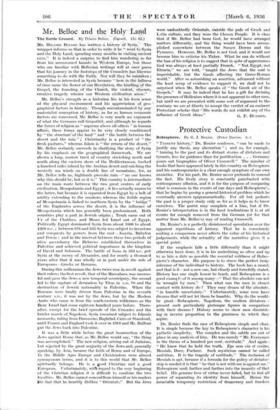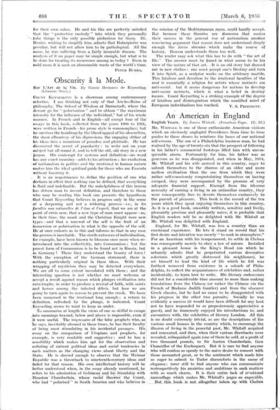Protective Custodian
Robespierre. By G. J. Ranier. (Peter Davies. 5s.) "PATIENT history," Dr. Renier confesses, " can be made to justify any thesis, any aberration " ; and so, for example, " turning to the past and its distant stories of dictators and tyrants, less for guidance than for justification . . . Germany pours out biographies of Oliver Cromwell." The number of books that have appeared lately in this country on Robespierre and his contemporaries is a clear enough symptom of our own anxieties. For his part, Dr. Renier never pretends to conceal the fact. His lively story is constantly punctuated with contemporary allusion, and it is for the purpose of comparing what is common in the events of our days and Robespierre's, that he begins by posing a general historical problem which he eventually answers epigrammatically. For all but pedants the past is a proper study only so far as it helps us to know ourselves. The purist may complain of a bias, but if Dr. Renier'S interpretation is in the least tendentious it is at all events far enough removed from the German (or for that matter from Mi. Belloc's) way of reading Cromwell.
Dr. Rcnier's is a perfectly disinterested speculation Over the apparent repetitions of history. That he is consciously making a comparison never affects the value of his historical judgements, while the actuality of the narrative gives it a special point.
If the emphasis falls a little differently than it. Wight otherwise have done, it is in his underlining as often and up to as late a date as possible the essential mildness of Robes- pierre's character. His purpose is to stress the perfect insig- nificance of the individual to history. The book has a moral, and that is it—not a new one, but clearly and forcefully stated. History has one single lesson to teach, and Robespierre is a good exam': 1?. of it among many—" That the absolute can not be wrought by men." Then what can the men in closest contact with history do ? They may dream of the absolute, " in humble uncertainty." Unfortunately, some men have dreams that will not let them be humble. Why do the would- be great—Robespierre, Napoleon, the modern dictators— present such particularly grotesque figures in comparison with their dreams ? History seems to show men diminish- ing in inverse proportion to the greatness to which they aspire.
Dr. Renier finds the case of Robespierre simple and clear. It is simple because the key to Robespierre's character is his pathetic simplicity. The complex and the subtle are put of place in any analysis of him. He was merely " Mr. Everyman in the throefi of a hundred per cent. certitude:" And again : " He knew that he held the truth. Ego sum via et reritas, Messiah, Duce, Fuehrer. Such mysticism cannot be tailed ambition. It is the tragedy of certitude." The inclusion of Messiah is apt, because if a formula for the policy of dictator- ship is needed it is that " he that is not with me is against me." Robespierre sank further and further into the insanity of that belief. His genuine love of virtue never failed, hut he lost all power 'of separating its identity frorri himself. Plenee the invariable temporary restriction of democracy and freedom for their own sakes. He and his like are perfectly satisfied That the " protective custody " into which they personally take things is the only possible protection for them: Dr., Renier, wishing to simplify him, admits that Robeepierre was peculiar, but will not allow him to be pathological. All the same, he was suffering from a fairly incurable disease. The analysis of it on paper may be simple enough, but what is to be done for treating its recurrence among us today ? Even in mild cases it is such an abominable waste of the world's time.
PETER BURR&

















































 Previous page
Previous page